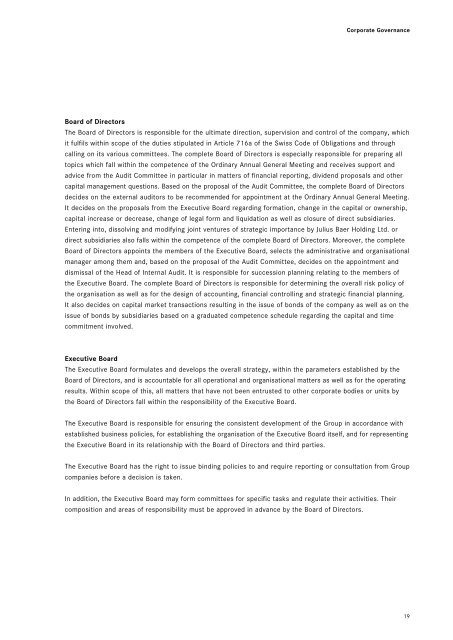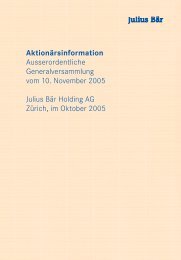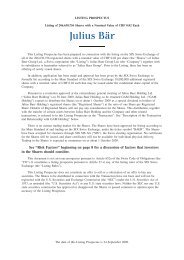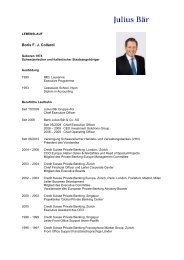2008 Annual Report Julius Baer Holding Ltd. - Julius Bär Gruppe
2008 Annual Report Julius Baer Holding Ltd. - Julius Bär Gruppe
2008 Annual Report Julius Baer Holding Ltd. - Julius Bär Gruppe
Create successful ePaper yourself
Turn your PDF publications into a flip-book with our unique Google optimized e-Paper software.
Corporate Governance<br />
Board of Directors<br />
The Board of Directors is responsible for the ultimate direction, supervision and control of the company, which<br />
it fulfils within scope of the duties stipulated in Article 716a of the Swiss Code of Obligations and through<br />
calling on its various committees. The complete Board of Directors is especially responsible for preparing all<br />
topics which fall within the competence of the Ordinary <strong>Annual</strong> General Meeting and receives support and<br />
advice from the Audit Committee in particular in matters of financial reporting, dividend proposals and other<br />
capital management questions. Based on the proposal of the Audit Committee, the complete Board of Directors<br />
decides on the external auditors to be recommended for appointment at the Ordinary <strong>Annual</strong> General Meeting.<br />
It decides on the proposals from the Executive Board regarding formation, change in the capital or ownership,<br />
capital increase or decrease, change of legal form and liquidation as well as closure of direct subsidiaries.<br />
Entering into, dissolving and modifying joint ventures of strategic importance by <strong>Julius</strong> <strong>Baer</strong> <strong>Holding</strong> <strong>Ltd</strong>. or<br />
direct subsidiaries also falls within the competence of the complete Board of Directors. Moreover, the complete<br />
Board of Directors appoints the members of the Executive Board, selects the administrative and organisational<br />
manager among them and, based on the proposal of the Audit Committee, decides on the appointment and<br />
dismissal of the Head of Internal Audit. It is responsible for succession planning relating to the members of<br />
the Executive Board. The complete Board of Directors is responsible for determining the overall risk policy of<br />
the organisation as well as for the design of accounting, financial controlling and strategic financial planning.<br />
It also decides on capital market transactions resulting in the issue of bonds of the company as well as on the<br />
issue of bonds by subsidiaries based on a graduated competence schedule regarding the capital and time<br />
commitment involved.<br />
Executive Board<br />
The Executive Board formulates and develops the overall strategy, within the parameters established by the<br />
Board of Directors, and is accountable for all operational and organisational matters as well as for the operating<br />
results. Within scope of this, all matters that have not been entrusted to other corporate bodies or units by<br />
the Board of Directors fall within the responsibility of the Executive Board.<br />
The Executive Board is responsible for ensuring the consistent development of the Group in accordance with<br />
established business policies, for establishing the organisation of the Executive Board itself, and for representing<br />
the Executive Board in its relationship with the Board of Directors and third parties.<br />
The Executive Board has the right to issue binding policies to and require reporting or consultation from Group<br />
companies before a decision is taken.<br />
In addition, the Executive Board may form committees for specific tasks and regulate their activities. Their<br />
composition and areas of responsibility must be approved in advance by the Board of Directors.<br />
19











